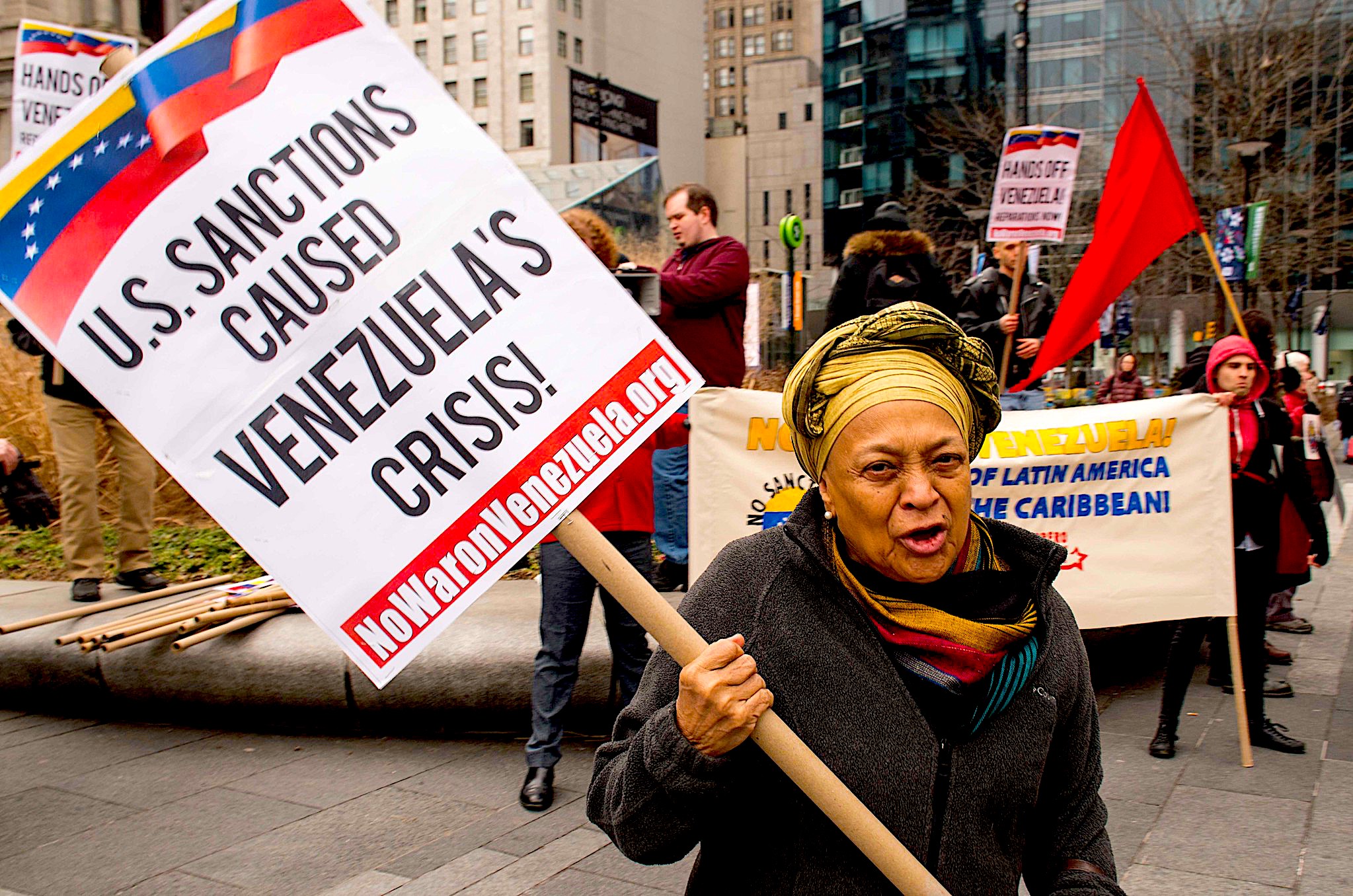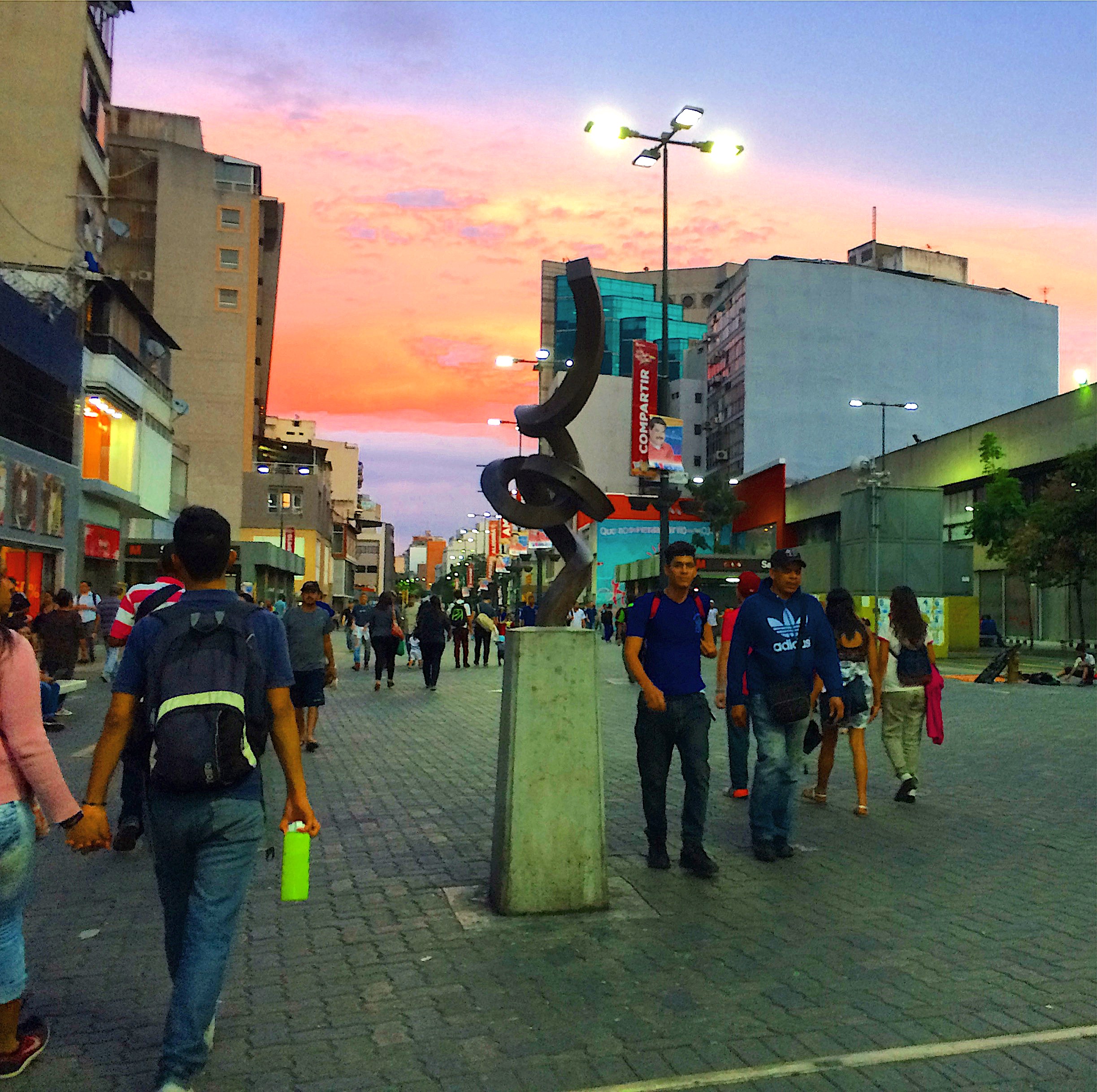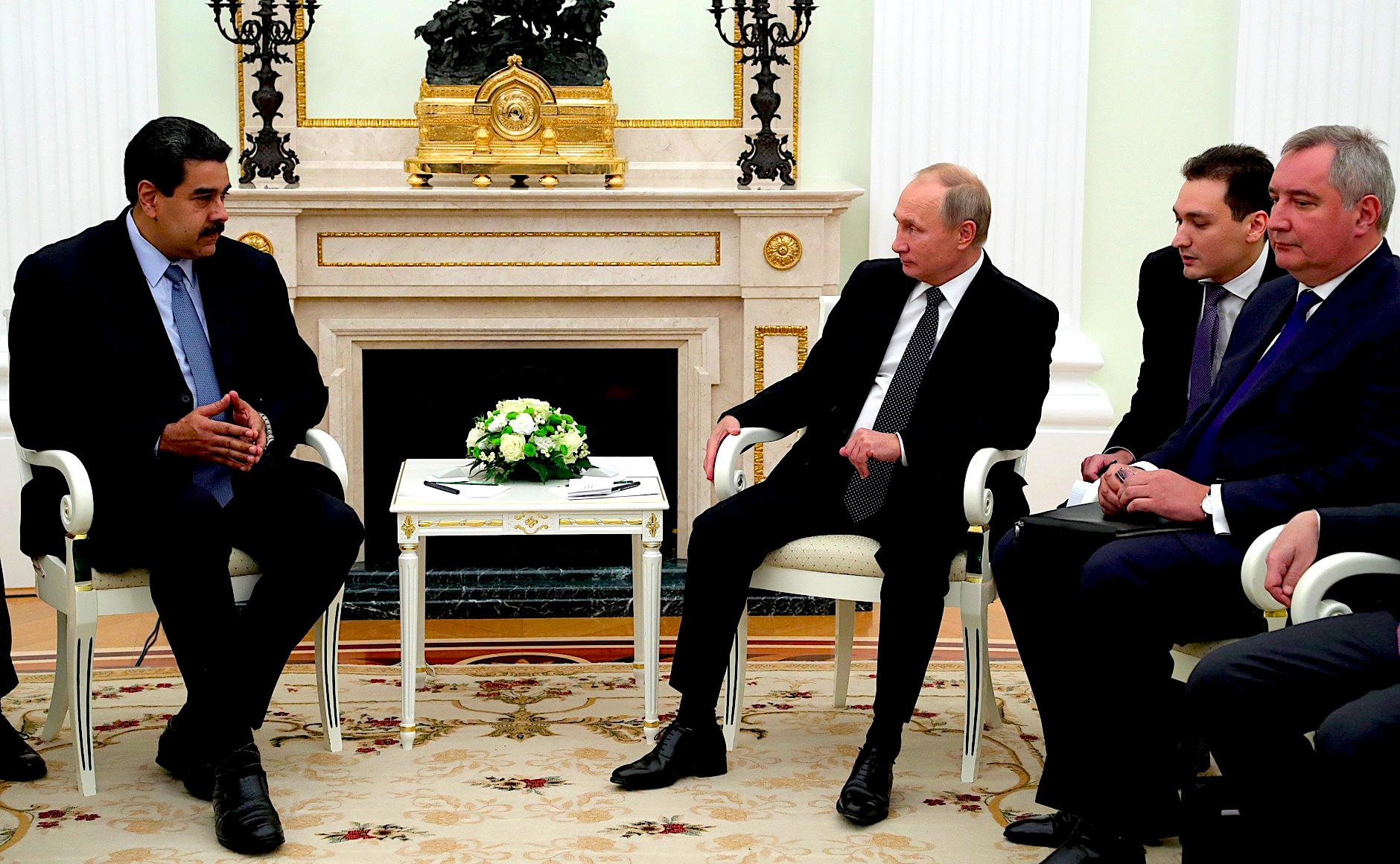Now that Cold War II has set in, Steve Ellner says Caracas’ strategic alliance with Moscow has become a greater priority for Washington.

President Joe Biden, left, with Juan S. Gonzalez, who headed the U.S. delegation to Venezuela in March, at right. (Twitter)
By Steve Ellner
Special to Consortium News
 Venezuelan President Nicolas Maduro’s repeated calls for dialogue with the U.S. in order to normalize relations seem to be paying off.
Venezuelan President Nicolas Maduro’s repeated calls for dialogue with the U.S. in order to normalize relations seem to be paying off.
His openness to rapprochement contrasts with the Biden administration’s nebulousness regarding the degree to which Washington is willing to recognize Maduro as president (full diplomatic recognition is out of the question).
Biden’s use of sanctions as a bargaining chip to wrest concessions from Caracas is a harder sell than former President Donald Trump’s regime-change narrative on the basis of the preposterous Responsibility to Protect (R2P) principle, sometimes referred to as “humanitarian intervention.”
Over the last two months, the flip flops and timidity of the Biden administration have been put on full display.
In early March, Biden sent a high-level delegation to Caracas to talk to Maduro, but then just days later backed off in light of the backlash led by Florida’s congressional bloc headed by Sens. Marco Rubio and Rick Scott and seconded by Sen. Bob Menendez.
Biden spokeswoman Jen Psaki told journalists not to waste their time speculating “about the future of the United States importing oil at this point in time…from Venezuela.”
More recently, the Economist reported that the Biden administration is planning to reengage Maduro’s representatives in a meeting in Trinidad. Shortly thereafter, however, U.S. Assistant Secretary of State Brian Nichols denied the report and claimed that the only issue under discussion in the March meeting in Caracas was related to Venezuelan democracy. The remark contradicts a previous White House statement that the March meeting discussed “global energy security.”
For many centrists, the Biden administration’s ruling out of the military threats and actions employed by Trump appears to be benign and a step in the right direction.

“U.S. Hands off Venezuela” demonstration in Philadelphia on Feb. 23, 2019. (Joe Piete, Flickr, CC BY-NC-SA 2.0)
That appearance is enhanced by the belligerent attacks on Biden by the Florida congressional bloc for his use of “sanctions placed on the Maduro regime as a bargaining chip with an illegitimate dictatorship to produce more oil.” Their statement decries Washington’s engagement with Maduro for representing a tacit recognition of his government and undermining the legitimacy of Venezuela’s bogus president, Juan Guaidó.
As part of the Florida-based campaign, Gov. Ron DeSantis spoke at a rally against buying Venezuelan oil — the supposed purpose of the talks with Maduro.
Biden’s unwillingness (or inability) to boldly explain and defend his change of policy to U.S. voters also contrasts with former President Barack Obama, who put his cards on the table when he reestablished diplomatic relations with Cuba.
Indeed, it’s hard to know exactly what Biden has in mind as to how to proceed, assuming he himself knows. Brian Winter, vice president of the Council of the Americas, was right in saying at the time of the first delegation to Venezuela that “until we know precisely what the Biden administration is trying to achieve, it’ll be difficult to evaluate how far this détente can go.”
Ripple Effect
Biden’s overtures have worked to Maduro’s advantage, even with, of all places, Brazil.
In late April, Brazil’s Foreign Minister Carlos França stated:
“At a moment in which the United States considers making an exception to the embargo on Venezuelan oil exports, it seems to me that we can think in terms of reevaluating the issue of diplomatic relations.”
Exactly two years before, Bolsonaro had closed Brazil’s embassy in Venezuela.
Following suit on April 29, Mexico’s President Andrés Manuel López Obrador called Biden to discuss the Ninth Summit of the Americas to be held in Los Angeles in early June. He urged Biden for “all the countries of the Americas [to] receive an invitation, without excluding anyone.”
Donate to Consortium News‘
2022 Spring Fund Drive
Shortly before López Obrador made the call, the State Department’s Brian Nichols had addressed reporters on the upcoming summit stating, in reference to Venezuela, Cuba and Nicaragua, “they are unlikely to be there.”
The ripple effect of Washington’s diplomatic mission to Venezuela also reached Ecuador’s conservative President Guillermo Lasso.
In a joint press conference with Argentina’s President Alberto Fernández, Lasso said that his government welcomed the rapprochement between the U.S. and Venezuela and would consider reestablishing diplomatic relations with the latter.
Fernández, for his part, defended his government’s decision to reestablish full relations with Venezuela and called on other countries in the region to do the same, noting “Venezuela has had a difficult time.”

Caracas, 2018. (QuinteroP, CC BY 4.0, Wikimedia Commons)
This groundswell in opposition to Venezuela’s ostracization is going to be hard for Washington to contain, especially in light of left and center-left electoral victories since 2018 in Mexico, Argentina, Bolivia and, more recently, Chile and Honduras. Progressive candidates are slated to win in upcoming presidential elections in Colombia and Brazil.
It’s Not Just the Oil
The mainstream media attributed the Biden administration’s abrupt abandonment of its Venezuelan initiative to the backlash from Rubio and company. They were half right.
After all, the State Department had to have anticipated the political consequences when they sent the delegation to Venezuela apparently to negotiate the resumption of oil flows to compensate for shortages resulting from the U.S. sanctions against Russia oil imports.
The Biden administration may have balked, not because of the predictable outcry from Rubio and company, but because Washington didn’t get what it wanted. After all, the delegation’s objective was not just about oil. That’s what the BBC concluded: “So, could the US visit be more than just oil? An attempt to change Venezuela’s political allegiances, perhaps?”

From left, Presidents Nicolas Maduro and Vladimir Putin in October 2017. (Kremlin, Wikimedia Commons)
In the words of the Financial Times on March 9, it was to “coax Maduro away from Moscow’s embrace” and assume a more neutral stand on the Ukraine invasion.
Congressman Gregory Meeks, chair of the House Foreign Affairs Committee, said the same when he stated “re-engagement with Venezuela… serves to shift Venezuela away from the malign influence of Vladimir Putin.”
The problem is that Maduro, who has leaned over backwards to assure Washington that he has become investment-friendly toward big oil, refused to turn his back on President Putin. Thus, Venezuela recognized the independence of eastern Ukraine’s two separatist republics just hours after Putin did.
Immediately after the U.S. mission left Caracas in March, Maduro gave Washington a glimmer of hope when he called for dialogue between Moscow and Ukraine, but then reiterated his unconditional support for Moscow.
There is an ideological component to Maduro’s position on Ukraine. The U.S., according to him, wants to “destroy it [Russia] in pieces and end the hope of a multi-polar world where we can all live.”
Now that Cold War II has set in, geopolitical considerations become a greater priority for U.S. foreign policy.
As Prof. John Mearsheimer, a leading strategist belonging to the school of realism of international relations, has pointed out, maintaining a secure hemisphere is of greater concern than conflicts elsewhere in the world since it provides the U.S. with an advantage over adversaries located in regions characterized by strife.
The same thesis predicts that other great powers (read China and Russia) will attempt to challenge “regional hegemony,” in the U.S.’s “neighborhood.” Caracas’ strategic alliance with Moscow, which includes Russia’s deployment of warships in Venezuelan ports, takes on a special significance within the framework of Mearsheimer’s line of thinking.
Biden’s bargaining-chip strategy toward Venezuela of lifting some of Washington’s estimated 502 coercive measures in return for concessions is designed to achieve two sets of objectives: providing the United States with much-needed oil and influencing Maduro’s foreign policy.
Juan Gonzalez, the hard-liner who headed the delegation to Venezuela in March, clearly indicated that the use of sanctions goes far beyond their stated purpose:
“The sanctions on Russia are so robust that they will have an impact on those governments that have economic affiliations with Russia, that is by design.”
Bloomberg News spelled out the “soft-power” strategy employed by the Biden administration in an editorial headlined “Approaching Venezuela is Worth the Risk.” The horse-trading proposal would consist of the following:
“In exchange for Venezuela suspending its military cooperation with Russia, the Biden Administration should lift some sanctions against Caracas to allow the country to import equipment to upgrade production facilities and resume oil sales to the United States.”
Bloomberg went on to call for tough bargaining: “Any further steps toward normalization should be conditioned on Venezuela’s willingness to accelerate market-oriented economic reforms” at the same time that Washington would continue to recognize Guaidó.
Bloomberg then summarized its approach:
“Unpalatable as it may be, engaging with the Venezuelan regime is critical to protecting core U.S. interests and containing Russian influence in the Western Hemisphere.”
Biden’s horse-trading strategy has much in common with Trump’s threats and actions in favor of regime change through military force. In both cases, the will of Venezuelans is ignored as is their suffering. What makes the current situation even more despicable is that the bargaining chips were formerly designed to get Venezuela to revise economic policy and now there is an added objective, namely a change in foreign policy.
Pro-Biden centrists who see his approach to Venezuela as more “humanitarian,” fail to consider how far removed the Venezuelan people are from Washington’s calculations and political maneuvers.
Steve Ellner is a retire professor from the Universidad de Oriente in Venezuela and is currently an associate managing editor of Latin American Perspectives. His latest books are his edited Latin American Extractivism: Dependency, Resource Nationalism and Resistance in Comparative Perspective (Rowman & Littlefield, 2021) and his co–edited Latin American Social Movements and Progressive Governments: Creative Tensions between Resistance and Convergence (Rowman & Littlefield, 2023).
The views expressed are solely those of the author and may or may not reflect those of Consortium News.
Help Us Beat the Censors!
Donate to Consortium News‘
2022 Spring Fund Drive
Donate securely by credit card or check by clicking the red button:

Americans are amazingly selfish and egoistic, so much so that they are out of touch with anyone else in the world. They think only of their own interests and demands others to capitulate to their demands using threats of sanctions, regime change or acts of war, and yet expect to be respected, loved AND admired. Furthermore the Americans are fickle and untrustworthy even with agreements they have signed, thinking they can break any signed agreements as and when they want while others shouldn’t, and that others should just accept that without reacting or making other future plans. The entire world is to serve American interests at their own expense. Not only the American elites are like this, the general American public thinks this behaviour is okay too, otherwise where is the protest against such behaviour of their elites? And then the Americans wonder why the world hates them.
“Bloomberg News spelled out the “soft-power” strategy employed by the Biden administration ”
Lately, the most successful application of “soft-power” was the decision to use “less than rock-solid intelligence finding” in daily dictations to reporters. Given the firmness level of findings use in such dictations before, the decision to use “less than rock solid” probably meant consistence that was not entirely liquid, say, cheese curds.
Piotr: Indeed. I’m sure they glossed over the point that it is directed at the home crowd. As for “less than rock solid…”, more bluntly, complete disinformation to support an increasingly desperate narrative. With so many distortions in motion, it is ultimately like a house of cards waiting to fall. Time is against the narrative controllers. Thus, more desperation and a whole new department.
The ineptitude of the US foreign policy clique is staggering. This is true not only of the Biden administration but of all administrations going back at least to George W. Bush. Neoconservatives/liberal interventionists rule the roost. A pox on them.
Victor Navasky’s point that McCarthyism removed anyone from the State Department who knew anything is very cogent. We have been blessed with these ignoramuses for many decades now; they are crucial for serving their masters, but they do not serve anyone else well.
““In exchange for Venezuela suspending its military cooperation with Russia, the Biden Administration should lift some sanctions against Caracas to allow the country to import equipment to upgrade production facilities and resume oil sales to the United States.””
Bwa ha ha!
OMG.
Does this look as absurd and childishly out of touch with reality to others as it looks to me?
If Ven has oil, Ven is the one with leverage—not the USA.
Ven should respond:
“Lift all the sanctions, and then we can talk about oil.
As for our sovereign state’s foreign policy, that is none of your business.
If you try this again you will get NO oil.”
Hai buddy, you paint the real picture but the US posturing and rhetorics are mainly meant to inflate the egos of the domestic audiences and befool the imaginations of US allies abroad particularly those within their hemisphere.
I just cannot imagine which sector of “domestic audiences” clamors to clobber Venezuela with sanctions and periodically, support an ineffectual coup attempt.
Well yeah, but at the risk of being ultra-left, I would add the following to Venezuela’s bargaining position:
Permanently end the blockade/Embargo on Cuba as well as all sanctions. End all sanctions against Nicaragua. Immediately drop all charges, release and repatriate our emissary Alex Saab.
Talks to include returning: our stolen gold at the Bank of England and Citgo.
Too much?
Right. So Venezuela should shift its alliance to America so that America can destabilize, invade, or destroy it whenever Washington gets the urge. It’s not as if Venezuela would be the first to find out how frivolous and vacuous a “peace treaty” with America is, now would it?
All of the thousands of sanctions the USA uses to punish disobedient countries and people all over the world are ILLEGAL, immoral and so hypocritical. Which is the most belligerent nation, invading and occupying anywhere it chooses, with no punishment for any of the perpetrators who “rule” the USA? Who has a “democracy” where every seat in the Congress is determined by money? Which country has caused millions of deaths and billions of dollars of destruction as it decides who is to be aided, and who excluded, from governing his or her country?
Stop all the sanctions, and do not pretend to be some sort of savior of the world. Venezuela had hundreds of years of US domination before it finally elected and valued Hugo Chavez. Maduro is the present elected leader, decided by Venezuelans, as it should be.
Why should Venezuela trust anything that Washington has to say to them? They must realise that Washington’s word is absolutely no good… about anything.
Venezuela must demand that Madura and his government be recognised as entirely legitimate and Juan Guiado deposed as a pretender.
The Venezuelan embassy in Washington must be returned to Madura.
Arco Gasoline Company and any other businesses confiscated by Washington must be returned BEFORE Washington begs for any favors.
Venezuela’s $8 billion in gold in the Bank of England must be returned to the Venezuelan government.
If Juan Guaido has spent any of it, that’s on Washington and must be returned.
Washington must be told that it is the government of Venezuela that picks and chooses its international friends, allies and business partners. Any demands to betray Russia and China must be rejected. These should all be preconditions just for Washington to be given that courtesy of speaking with the true Venezuelan government which Washington has tried to topple of over two decades.
Venezuela has coped with American treachery for twenty years or longer and they have survived. They should not give up their principles or betray their friends just to accommodate Washington’s need to acquire heavy sour crude just because they now refuse to buy it from Russia. Washington, as always, is just being expedient and will turn on a dime to betray Venezuela again in the future. As a lifelong resident of Hell’s Half Acre here on Earth I implore Madura not to trust the Devils in Washington. Not even for the time of day. Most of my fellow Americans do not trust those SOB’s. Remember, this is the Empire of Lies.
Madura could have received Washington’s approval to his elective office years ago. All he had to do was renounce Chavez’s “Bolivarian Revolution,” hire back all the compradors working for Washington and return the income from the national oil industry to the right wing oligarchs from whom it was taken to support the entire population, including the formerly oppressed poor. Guess what, he was not required to do any of that to remain in office and for Venezuela to remain free and independent.
Of course, Washington resists following the legal and decent course of action and has made life miserable for all the people of Venezuela. Madura must not relent simply to help Washington escape from the jam it has created for itself. Again, I repeat that Washington’s word is no good and they will break any deal they make with Venezuela. Just ask Iran (about nuclear technology) and Russia (about missile deployments), a couple of other countries that Washington repeatedly stiffed on treaties and deals. Washington’s credibility is as low as the value of the dollar is about to become. Do not squander Venezuela’s future for a few rapidly depreciating Petro-Bucks.
lift some sanctions against Caracas to allow the country to import equipment to upgrade production facilities and resume oil sales to the United States.
Wonder if they’ll keep giving the money from the oil sales to Guaido the Gusano.
Are there any depths to which American behaviour will not reach?
No.
It’s rather heartening to see the US criminals eat crow in this situation. It’s also great to see other nations stand up to the atrocious bully in the global sandbox.
“When you find yourself in a hole, the first thing to do is STOP DIGGING.”
This bit of wisdom from Will Rogers seems to have been lost on the Washington regime.
“Pro-Biden centrists who see his approach to Venezuela as more “humanitarian,” fail to consider how far removed the Venezuelan people are from Washington’s calculations and political maneuvers.”
Would I be wrong to assume that the same can be said about how far removed the American people are from Washington’s calculations and political maneuvres?
Yes. US citizens–or maybe more accurately US consumers–are far more removed from its government’s actions than the Venezuelans.
Venezuela should demand:
The US (and vassals) must immediately and unconditionally end the illegal sanctions on Venezuela
Must restore diplomatic recognition of the Venezuelan govt. and president. (While denouncing Juan Play-Doh)
Return of all seized (stolen) finances and assets.
A written agreement to not interfere in domestic affairs.
Financial compensation for the damages and deaths caused by the illegal sanctions (economic warfare)
A formal apology for the illegal actions of the US govt. from the US Pres.
Criminal prosecutions for officials who perpetrated the many illegal actions.
That would be for starters, but I realize the US imperial overlords will agree to nothing of the kind. (at least for now).
All your points are well taken. US foreign policy towards Venezuela has been one in which the latter must subject itself to US designs. Good post.
Well put, JonnyJames.
That is a pretty good list of preconditions worthy of a sovereign nation and a president with self-respect.
Never trust anything the treacherous US promises. The whole world should understand this by now.
These Yanx…what frigging hypocrites! Now that the US needs oil…oh, yes, now Maduro is recognized as president of Venezuela. Tell Biden et all to take a very long walk on a very short pier. But…Venezuela does need the money.
Venezuela needs the sanctions lifted. Without the sanctions, Venezuela would be doing quite well.
I could not agree more.
It always amazes me the number of people who adamantly deny that the sanctions are in any way responsible for the economic crisis in Venezuela, nor the 20 years of Wall Street attacks on their currency. No, they insist, it’s only because of the Chavez/Maduro’s policies. I frequently wish that deliberate ignorance were painful.
The entire world would do much better without the frigging Yanx’s sanctions. For a change…sanction the US for all its nefarious actions all over the globe.